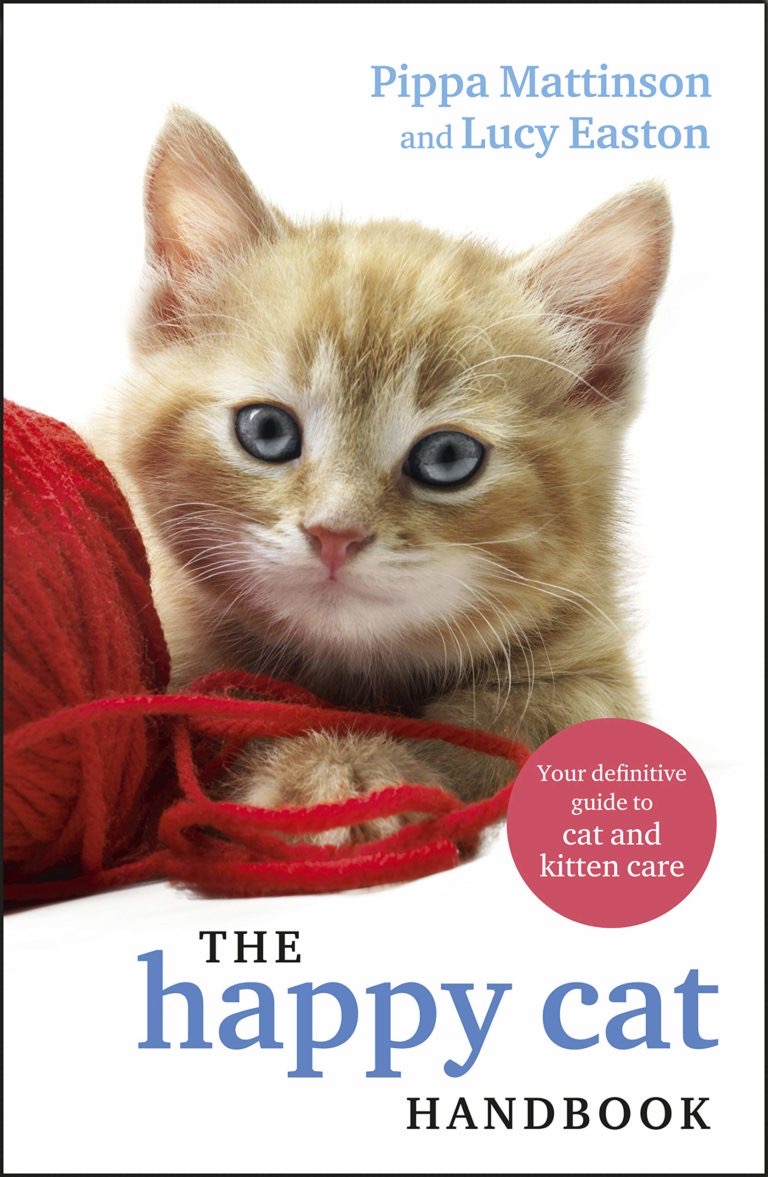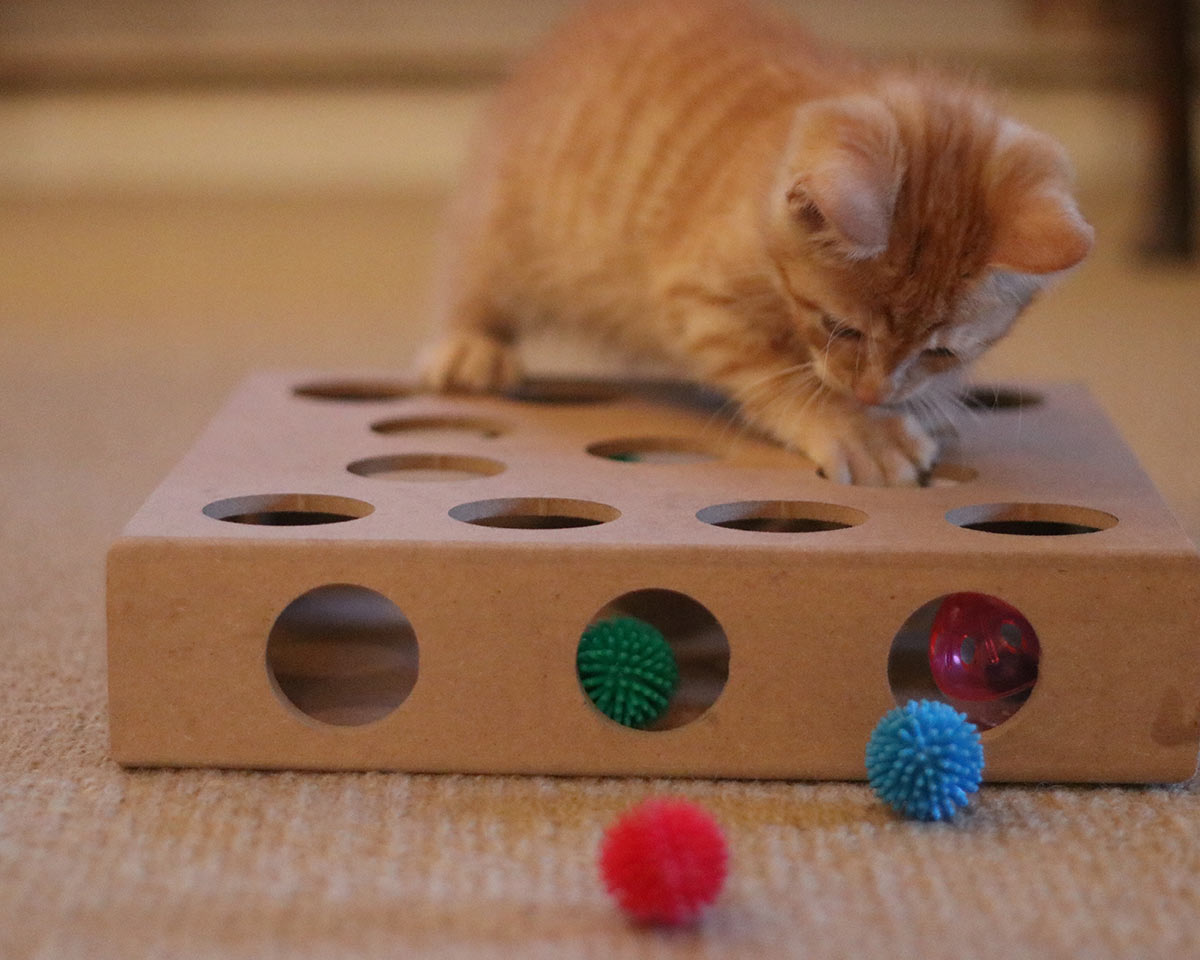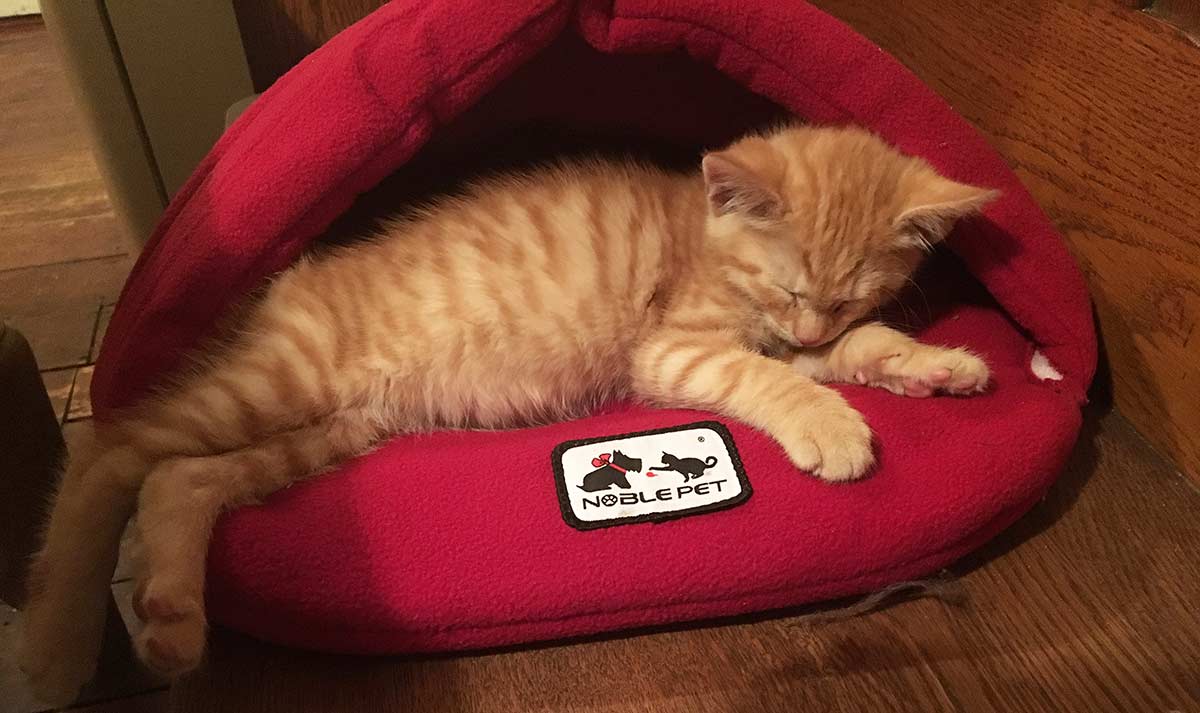8 Week Old Kitten – Feeding, Weight, Care And Routines
April 10, 2022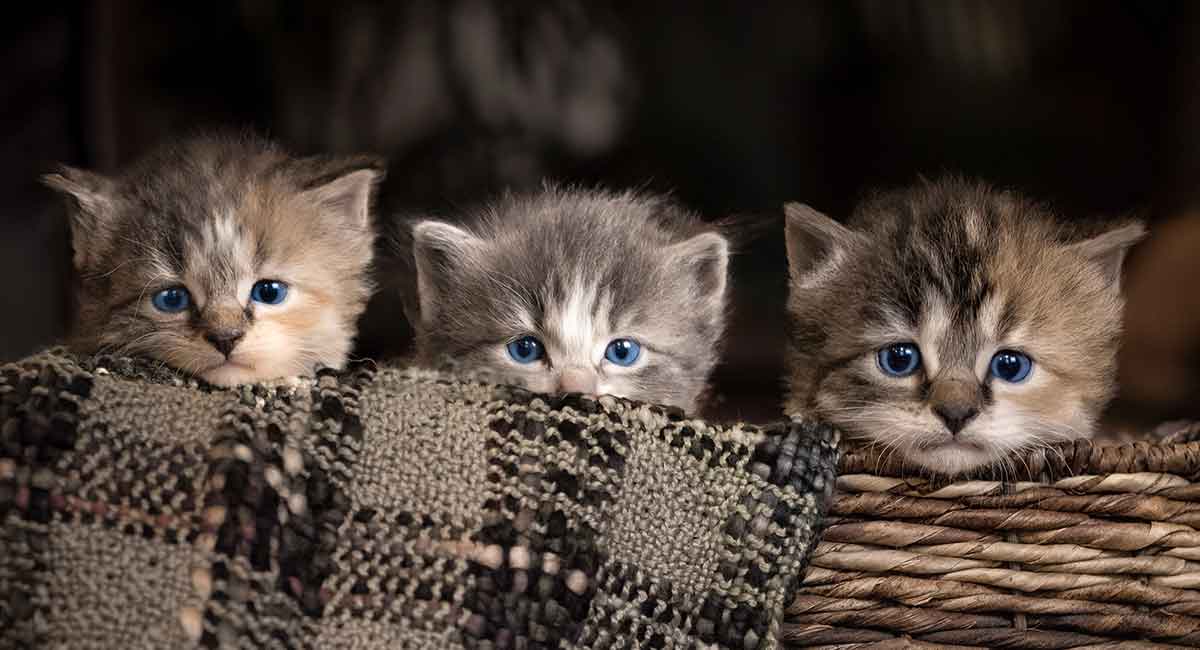
This is a complete guide to caring for your 8 week old kitten. You’ll find out how to look after a new kitten, what 8 week old kittens need, and how to settle your new kitten in to his new life with your family.
We’ll be looking at kittens’ weight. How much to feed a kitten at 8 weeks old, and the best food for them. We’ll look at potty training, playtime, and when and where your 8 week old kitten should sleep.
We’ve also added a troubleshooting section at the end, that aims to help with your common questions and problems. As we go, I’ll be sharing some cute kitten photos of my own 8 week old kitten, Billy, just after we bought him home. We’ll give you information on:
Why 8 weeks?
An 8 week old kitten is old enough to leave his Mum and join his future home. So for most of us this is the youngest age of kitten that we will ever find ourselves caring for.
Be wary of breeders that offer to let you take a kitten home at 6 or 7 weeks old. Kittens under 8 weeks old are not ready to leave their Mums and litter brothers and sisters. If you have brought home a kitten younger than 8 weeks old for any reason, have a chat with your vet. They will be able to support you in giving your baby kitty the best possible care.
Some pedigree cat breeds prefer to wait until their kittens are 12 weeks old, before they move on to their forever homes. In this article we are going to focus on 8 week old kitten needs.
8 week old kitten size
Your new kitten is going to be very small indeed at 8 weeks old. This makes him vulnerable. Especially for the first few days. It is one of the reasons that some pedigree cat breeders prefer to keep kittens until 12 weeks before letting them go to their new homes.

I know that I worried about stepping on Billy for those first couple of weeks and you probably will too. New kittens are easy to step on or trip over. Kittens just love winding themselves in and out of people’s legs, and have a very poor ability to judge risk, so you are going to need to be especially careful for a while. Walk slowly when your kitten is in the room, and be extra vigilant on the stairs.
Exactly how big your kitten is at 8 weeks will depend on what type of cat he is going to be. Large breed cats are unsurprisingly larger as kittens, Maine Coon kittens for example are a lot bigger at 8 weeks than smaller breeds.

Kitten weight by age
Many kittens are mixed breed and will grow into fairly average sized cats that will weigh around ten pounds or so once adult. Let’s give you a rough guide to the weight you can expect of an average cat at 8 weeks old and as he grows.
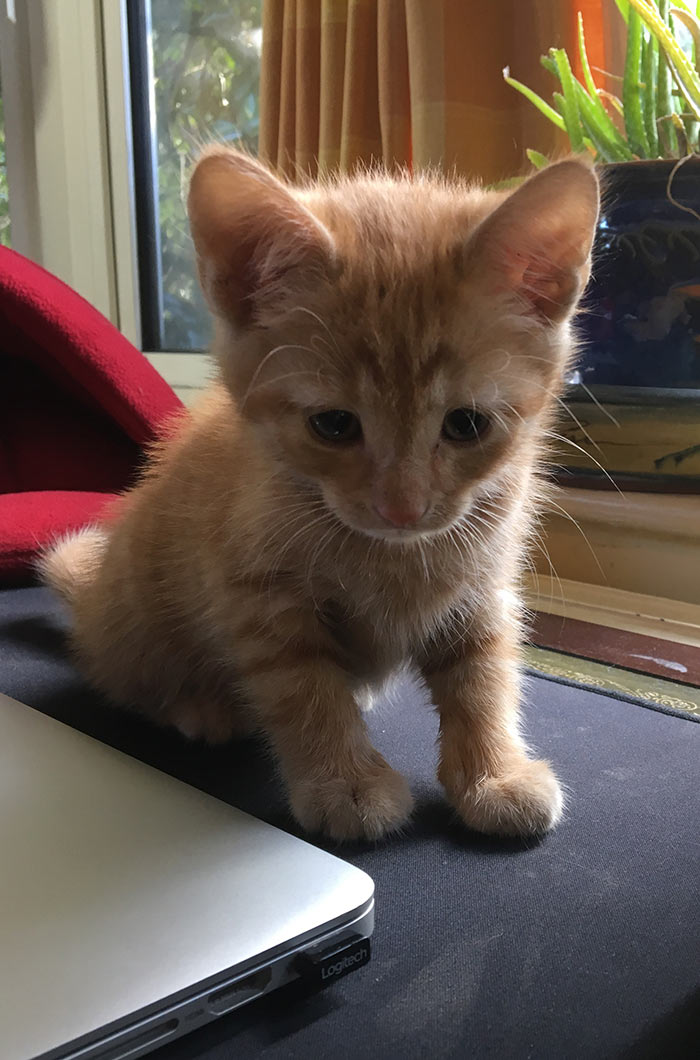
An eight week old kitten will usually weigh around 2lbs. Give or take a few ounces. By three months of age your kitten is likely to weigh about 3lbs and he will gain a pound or so each month up to around ten months old. That’s a small (13″) Macbook next to Billy to give you some idea of how tiny he was.
8 week old kitten care
It can be a little daunting taking on such a tiny and vulnerable animal at first, but fortunately, kittens are fairly easy to look after and they grow in confidence and stature every day. Caring properly for your kitten means giving him the right food to ensure he grows up healthy and strong, and providing regular veterinary treatment to keep him well and free from parasites.
Kittens also need to be potty trained and entertained. So we’ll be looking at those issues here too. Let’s start with feeding an 8 week old kitten.
What to feed kittens at 8 weeks old
There are several different types food manufactured as a kitten diet at 8 weeks. Dry food is very popular because it stores well, is light, is low odor and not messy. But sadly, it can cause problems.
For the best food for kittens at 8 weeks we recommend wet food*. This is especially important for male kittens, as dry food can give them painful crystals in their bladder. The first you may know of this is when you see blood in the litter box.
It won’t affect every male kitten but we don’t think it is worth the risk. There are lots of different types of kitten food on the market. It comes in cans, like the popular Purina brands shown above. And in pouches. Either is fine.
Look for a wet food that is specifically designed to provide a complete diet for a young kitten. Food for adult cats is not appropriate.
Billy’s food
Billy was fed on three UK brands: Thrive kitten food*, Lily’s kitchen*, and James Welbeloved*, and on Royal Canin* which is also available in the USA. There are usually twelve pouches to a box.
Blue grain-free kitten food* is especially good.
How well do you know your cat? Discover the secret world of cats.
The Happy Cat Handbook - A unique guide to understanding and enjoying your cat!
You tend to get what you pay for with pet foods and the cheaper varieties are often bulked up with fillers, so that you need to feed more. This means that the saving is not as great as it might seem. You’ll also see more waste in the litter box! So we recommend you buy the best quality food you can afford.
I also bought some dried food for Billy. We did not give him much of this, but added a tiny bit of this to some of his meals so that he would be used to eating different textures and flavors.
In addition, we also used it for training treats. Initially just to reward him for paying us attention. We chose Royal Canin for this*, and a small bag lasted us several weeks. Put it in an airtight box to make sure it keeps nice and fresh
How much to feed a kitten at 8 weeks
Eight week old kittens need only tiny portions of food. Exactly how much depends on the type of food you have chosen for your cat. Wet food comes in cans or pouches and many 8 week old kittens will need only about four ounces a day.
Be guided by the manufacturers recommendations, and remember to give a little more if your kitten is a large breed. And remember that hunger is not a great indicator of need. Some kittens are very greedy. Your kitten will also need more if he becomes underweight or fails to grow at a healthy rate. This daily food ration needs to be divided into several small meals.
How often to feed kittens 8 weeks old
Tiny cats have tiny stomachs. If you give your kitten too much to eat he will get fat, and if you give him all his daily food allowance in one or two meals, he’ll get diarrhea.
This means that kittens have to be fed little and often. An eight week old kitten needs four meals a day. Breakfast, lunch, tea and supper. Here is an example – this is the routine my kitten Billy was on for the first couple of weeks
- 7:30 am 1/4 of a 3.5 oz (100g) can of Lucy’s kitchen – just under an ounce (25g)
- 11 am Two heaped teaspoons of Thrive Kitten food – this is slightly less than half a 2.5oz (75g) can so about 1 ounce (30g)
- 2:30 pm 1/4 of a can of Lucy’s kitchen
- 7 pm Two heaped teaspoons of Thrive Kitten food
You’ll feel more confident when you have read our complete guide to feeding your kitten – but try not to worry, it isn’t hard to get this right.
When an eight week old kitten won’t eat
Moving home is a really big deal when you are 8 weeks old. Some kittens are very nervous at first and may refuse to eat. If your kitten hides in his carry box when you get home with him and doesn’t seem interested in the bowl of food you have prepared especially for him, try tempting him out with a little bit of juicy kitten food on the end of your finger.
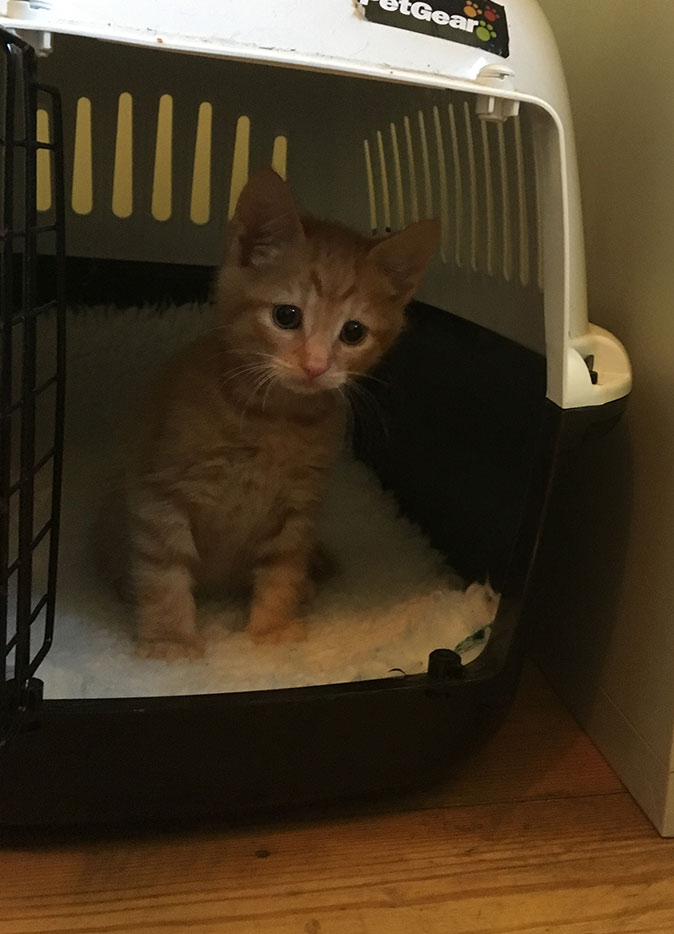
Don’t worry if your kitten doesn’t eat much that first day, provided that he seems active and otherwise in good health. But if he is still not eating the following day, you need to take him to a vet.
Tiny kittens can’t afford to lose much weight or go more than 24 hours without a meal, and the cause of the problem needs to be swiftly identified. If you’re not sure whether to visit the vet, give them a call. They’ll be able to let you know whether your kitty needs to see them.
Billy’s kitten carrier came from Amazon*
Potty training your 8 week old kitten
Fortunately, litter box training a kitten is rarely a problem. Many kittens arrive in their new homes fully litter box trained and all that you need to do is to make sure that the kitten can easily access his litter box, at all times of the day or night.
As a precaution, it’s a good idea to use a litter that he is familiar with. You can always try out different types of litter when you are happy he is using his litter box reliably.
Did you know that thousands of research papers have been published on cat behavior and health? No time to read them all? Don’t worry - we’ve done it for you! And picked out the best bits! The Happy Cat Handbook - A unique guide to understanding and enjoying your cat!
Later, when he is older, he’ll be able to wait if he can’t get at his litter box immediately, but for now, just make sure that the litter box is right where he can get at it, and you won’t go far wrong
You’ll find a complete guide to cat toilet training in our cat care section, and if the idea of not having to handle cat litter or poop appeals to you, check out our in-depth review of automatic litter boxes
What does a kitten at 8 weeks do all day – 8 week old kitten behavior
Most of us know that kittens are very playful, and you can spend a lot of money on kitten toys! But what do kittens really like to play with? And what do they do all day?
Well, perhaps the largest part of your new kitten’s time will be spent sleeping. Cats sleep a lot throughout their lives, but an 8 week old cat really does sleep for much of the day, and your kitten will probably be asleep for at least 18 hours out of every 24.
When your kitten is awake, he’ll enjoy playing with toys, and for a ‘quick shopping guide’ we have put together a collection of our own kittens’ favorites.
Billy’s favorite puzzle box (above)* came from Amazon.

I’ve also written a detailed review of the best toys for kittens that you might find helpful. It is of course heavily biased by my own kitten’s opinions!
As for where your kitten should sleep, whenever possible, he’ll probably chose your lap, or a place near to where you spend a lot of your time.
If you want to buy him a cozy bed of his own, he may enjoy a kitten cave*.
This was Billy’s favorite bed for the first few months of his life. You can find these in a range of colors on Amazon*
Troubleshooting your 8 week old kitten
After we published this article we received a number of questions from concerned kitty owners. The three biggest worries were:
- When should I take my kitten to the vet?
- My kitten is scared of my dogs
- My kitten isn’t friendly
We’ve taken a look at each of these problems here.
Let’s start with the vet
When you bring your new kitten home you should book an initial check up with your vet. They will make sure she is healthy, and talk to you about vaccines and ongoing check ups.
In addition to routine appointments like these, you should take your cat to the vet, or give the vet a call for advice, if you are concerned about any changes in your kitten’s health.
For example, if your kitten stops eating for 24 hours, if she has an upset stomach (vomit or diarrhoea), if she seems distressed or her behaviour changes. If she is injured. And if you have any other concerns about her health or behaviour.
Your vet should be your first port of call for any concerns about your kitten’s health. Of course this can all add up, so we recommend you insure your kitten with a comprehensive plan as soon as they join your family.
My kitten is scared of my dogs
Don’t panic if your kitten doesn’t instantly make friends with your dogs. These things can take time, and are best done gently with lots of supervision. Start by creating a safe room for your kitten, that the dogs cannot get into. Let them settle into their new room for a couple of days before attempting introductions.
Pick a time when cat and dog are relaxed and introduce them with the dog on a lead. Watch their body language. If they are unhappy stop, and try again later. Repeat these introductions several times a day. You can gradually build up the time they spend together.
Once the cat is freely sharing the your home with your dog, it is still a good idea to leave them a safe space that the dog cannot get into. At least for now. This gives your kitten somewhere to go when he needs a break from his new companion.
Unfriendly kitten
Don’t be surprised if your kitten is wary of you for the first day or so. Every cat is different. Remember giving them a safe space to hide in can help them feel safe while they settle in.
If however, your kitten doesn’t want to be touched, or hisses at you, after a day or two of settling in, they need to be checked over by your vet. Sometimes unfriendly behavior is caused by being ill or in pain.
Sadly if your kitten is still unfriendly after a couple of weeks, and the vet has ruled out illness and injury, he may not have been properly socialized before leaving his birth home. Keep trying to make friends, but it is likely that this cat will always be quite aloof.




